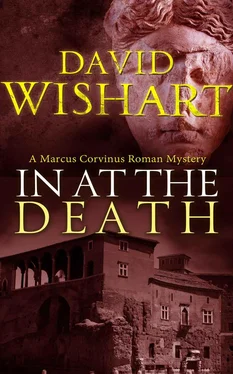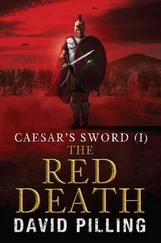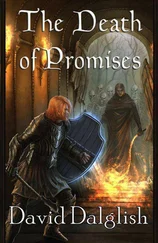David Wishart - In at the Death
Здесь есть возможность читать онлайн «David Wishart - In at the Death» весь текст электронной книги совершенно бесплатно (целиком полную версию без сокращений). В некоторых случаях можно слушать аудио, скачать через торрент в формате fb2 и присутствует краткое содержание. Год выпуска: 2015, Жанр: Исторический детектив, на английском языке. Описание произведения, (предисловие) а так же отзывы посетителей доступны на портале библиотеки ЛибКат.
- Название:In at the Death
- Автор:
- Жанр:
- Год:2015
- ISBN:нет данных
- Рейтинг книги:5 / 5. Голосов: 1
-
Избранное:Добавить в избранное
- Отзывы:
-
Ваша оценка:
- 100
- 1
- 2
- 3
- 4
- 5
In at the Death: краткое содержание, описание и аннотация
Предлагаем к чтению аннотацию, описание, краткое содержание или предисловие (зависит от того, что написал сам автор книги «In at the Death»). Если вы не нашли необходимую информацию о книге — напишите в комментариях, мы постараемся отыскать её.
In at the Death — читать онлайн бесплатно полную книгу (весь текст) целиком
Ниже представлен текст книги, разбитый по страницам. Система сохранения места последней прочитанной страницы, позволяет с удобством читать онлайн бесплатно книгу «In at the Death», без необходимости каждый раз заново искать на чём Вы остановились. Поставьте закладку, и сможете в любой момент перейти на страницу, на которой закончили чтение.
Интервал:
Закладка:
Bugger. Now that was something I hadn’t considered, and I should’ve done. He was right, of course: no property-owner of Carsidius’s class dirties his hands with the everyday, mundane processes that net him his yearly income. ‘Okay,’ I said. ‘So who does keep them?’
‘My bailiff, naturally!’
‘Yeah, I’d sort of assumed that. He got a name?’
‘The…’ Carsidius sat down and took a deep breath. ‘His name was Faustus.’
‘“Was”?’ My guts went cold. ‘You mean he’s dead?’
‘Certainly not! At least, as far as I’m aware. If you must know, I discharged him three days ago. For reasons which have no bearing on the matter and which don’t concern you.’
Uh-huh. And my name was Cleopatra. ‘So where is he now?’ I said.
‘Neapolis. Brindisi. Capua, perhaps. He may even have taken a ship from Ostia or Puteoli and gone abroad. In any event he told me at our last…meeting that he was leaving Rome. Where he chose to go when he left my employ was none of my concern, and I certainly didn’t bother to ask.’ Carsidius had picked up a stylus from the desk. ‘Now. This interview is at an end. I would ask you not to trouble me again.’
I stood up and set the wine-cup down carefully. ‘Fair enough,’ I said. ‘Thanks for your time.’
I was heading for the door when he said: ‘Corvinus!’
I turned. ‘Yeah?’
He was sitting with a face like one of the portrait busts. ‘I’ve always been a faithful servant of the emperor. I’ve done my duty, however unpleasant I’ve found it personally. I want you to remember that.’
‘Bully for you,’ I said.
I opened the door, and left.
One minor point, and it didn’t strike me until I was out in the street and beginning to cool down. When Carsidius had taken his oath, he’d used the word ‘killing’ apropos of Sextus Papinius; not ‘death’ but ‘killing’. Yeah, sure, I’d introduced the idea of murder myself, but only as a theory, and it wasn’t a theory that Carsidius — ipso facto — would be exactly ready to entertain. So why had he done it?
Shit, it was probably nothing, just my hypertrophied imagination kicking in again. All the same, it was interesting.
So what did I make of that?
I thought it over as I walked back down towards the Caelian. The guy had played absolutely true to form. I’d rubbed shoulders — reluctantly for the most part — with broad-stripers all my life, and Carsidius was right-down-the-middle typical: ego the size of the Capitol, touchy as hell where his honour was concerned — at least, as far as the part of it other people saw went — and fully prepared to lie through his teeth while at the same time damning your eyes for daring to question his veracity. The smart-as-paint Greeks, who can be cynically accurate buggers when they like, take their word for reputation — doxa — from the verb ‘to seem’, which is spot-on. With these bastards, appearances are everything, and to hell with the muckier reality. Papinius Allenius had been dead right when he’d bracketed Carsidius with Arruntius: they were a pair and no mistake, both in the bad and the good. Ignore the veneer of Roman honestas , which is a con in any case, think in terms of Greek doxa and you won’t go far wrong. For all Carsidius’s air of outraged rectitude I wouldn’t trust the guy an inch.
Not over the killing, mind. The broad-striper code may be elastic, but it only stretches certain ways: in some directions it’s rigid and unbreakable. Like taking unforced oaths. Carsidius hadn’t had to do that business with the altar, especially there in the study with his ancestors looking on. No, I was with Caepio there: whoever had had the kid murdered, it wasn’t our poker-backed senator pal. Or at least — thinking of the actual wording of the oath I stopped and rephrased that — at the time when the murder was being planned and committed Carsidius hadn’t known about it. That would’ve been a typical bit of senatorial wriggling…
So why had he compromised his reputation by lying about the bribes? Lied he definitely had, the business with the altar — again — proved that beyond a doubt. But if he was lying, then -
I slowed. Okay, Corvinus. Think it through, boy.
Reputation. Doxa . Carsidius had admitted bribery to me, sure, but that was in a one-to-one situation, with no witnesses. His reputation — as far as the rest of the world was concerned — was safe. Oh, yeah, he claimed he’d also told Balbus, but then Balbus was in the same boat. When we’d met I’d been the one to suggest that Papinius had been taking bribes. All Balbus had done was confirmed it; but — and this was the point — he’d made it clear that apart from talking to the boy himself he hadn’t taken the matter any further. So again we had the one-to-one, no witnesses scenario, because Papinius was long past confirming or denying anything. Okay. So what we had here was a closed circle. I start the bribery rumour myself, Balbus picks it up like the gift it is and passes it to Carsidius, who feeds it back to me, while telling me he’s already made his own confession to the aedile, who’s had the business shelved. Result — or this is the plan, anyway — dumb-head Corvinus goes off whistling into the sunset believing that Papinius was on the make, his boss had caught him at it and as a consequence the kid had committed suicide. End of case, end of investigation, pull down the blinds and go home…
It worked. Sure it did. The big question was why? Why should two prestigious, well-respected senators get together to produce a cover-up for a murder?
It didn’t make sense; none of it. Nor did the business with the keys. That had been another lie on Carsidius’s part, and not a very good one, either. Sure, he might well have had a bailiff called Faustus, but trying to shift the blame onto him and then telling me in the next breath that the guy had just been coincidentally sacked and had left Rome for parts unknown was in the tap-dancing oyster bracket. Keys were important, I knew it in my water. Carsidius knew it too, which was why the bastard had practically fallen over himself to fob me off. The question — again — was why?
It was starting to rain: big drops from a blackening sky. I covered my head with my cloak and picked up speed.
One last, last thing. That ‘something else’ besides anger in Carsidius’s look, when I’d asked him about the key.
It had been fear.
19
Well, that’d been short and sweet. I got home in plenty of time for a leisurely bath, a second-of-the-day shave and a less-than-hurried change into a decent lounging-tunic. Lippillus wouldn’t’ve minded if I’d got in on two wheels as usual, and neither would Marcina, who was a very nice lady indeed, but Perilla would’ve had my guts for sandal-straps. They arrived just short of sunset: bang on time, in other words, but then Lippillus knew and loved our Meton. Fifteen pre-dinner-drink minutes before zero hour was allowed; give it twenty and you were pushing things. Once, we’d had a couple of Perilla’s poetry-klatch cronies over for a meal and they were an hour late. We were having soles, and soles were what we got. In a way. How the surly bugger managed it I’ve no idea, but you could’ve walked on them to Puteoli.
‘Hey, pal!’ I said as the door-slave brought them through the peristyle into the garden; luckily, the rain had passed off and we had a fine evening. ‘Bathyllus, a drink for the Watch commander.’ I’d got in a jar of Signinan, special: Signinan’s mostly medicinal, but the top vintage — and this one was top, ten years old if it was a day — was something else, dry as a bone and when it was chilled sheer perfection. Lippillus was no wine expert, but he knew good stuff when he tasted it, and on a Watch commander’s pay that didn’t happen all that often. ‘Marcina. You want wine or are you having one of Perilla’s fruit juices?’
Читать дальшеИнтервал:
Закладка:
Похожие книги на «In at the Death»
Представляем Вашему вниманию похожие книги на «In at the Death» списком для выбора. Мы отобрали схожую по названию и смыслу литературу в надежде предоставить читателям больше вариантов отыскать новые, интересные, ещё непрочитанные произведения.
Обсуждение, отзывы о книге «In at the Death» и просто собственные мнения читателей. Оставьте ваши комментарии, напишите, что Вы думаете о произведении, его смысле или главных героях. Укажите что конкретно понравилось, а что нет, и почему Вы так считаете.












